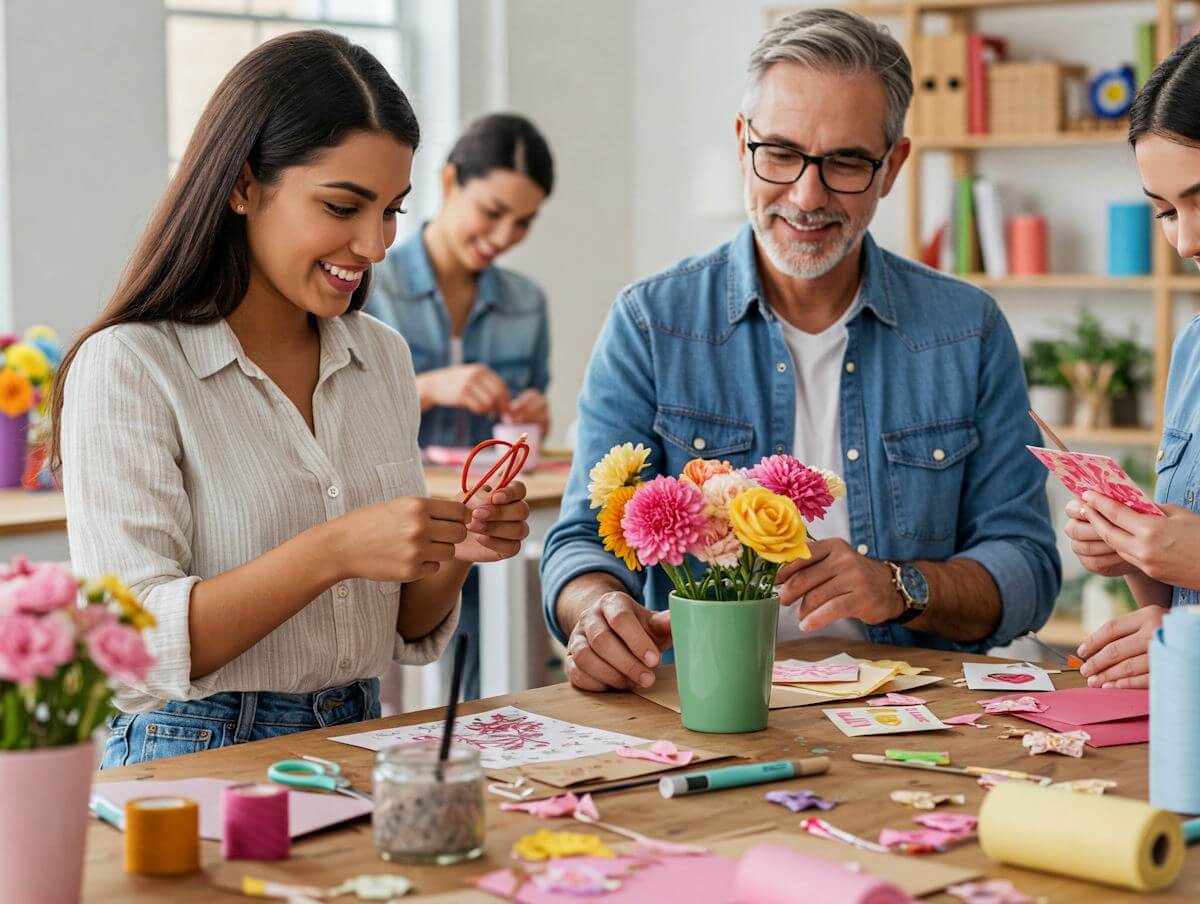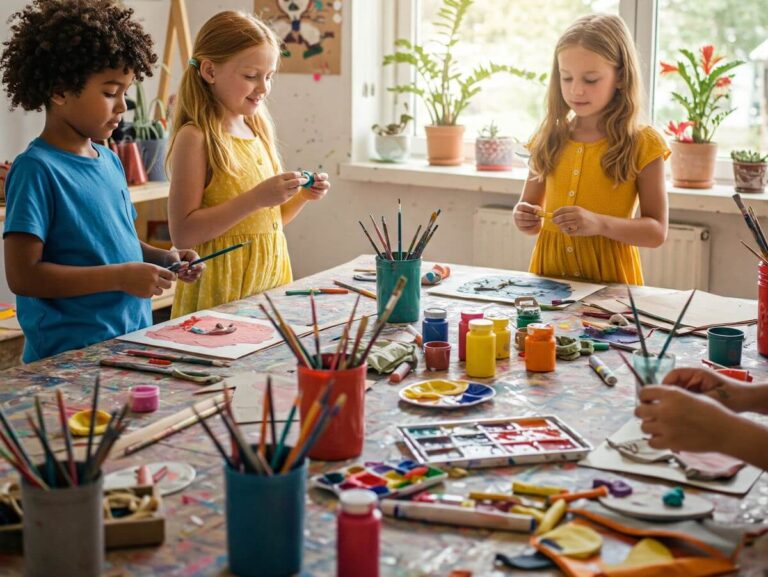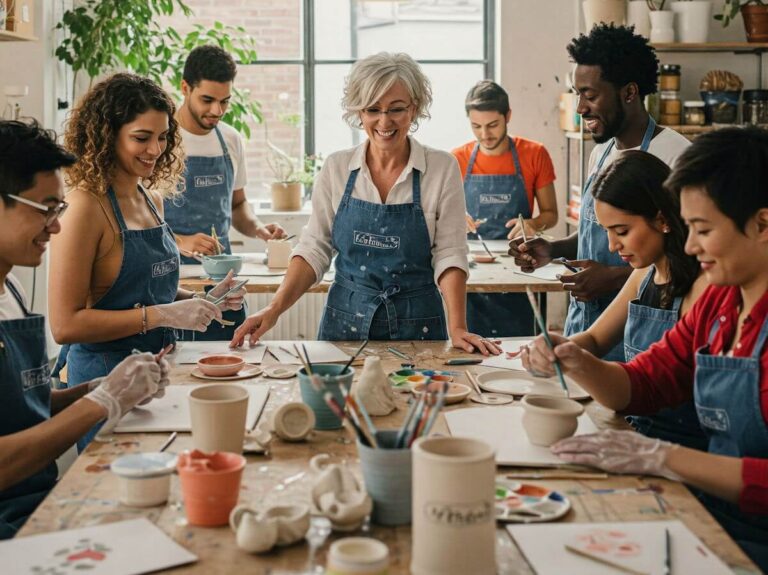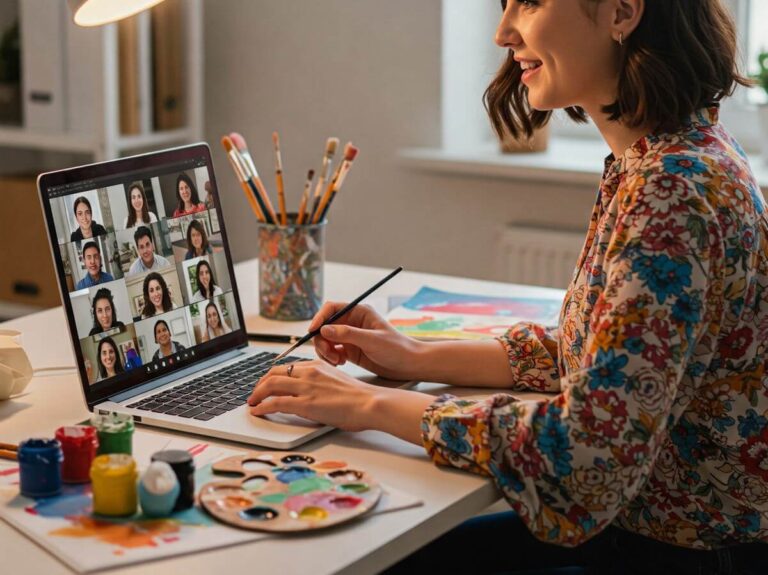DIY gift workshops have emerged as a captivating trend in recent years, providing individuals with an opportunity to engage in the creative process of crafting personalized gifts for special occasions. These workshops, which gather participants in a collaborative environment, emphasize the joy of creating something unique with one’s own hands. The popularity of DIY gift workshops can be attributed to a growing appreciation for handmade items, as well as a desire for meaningful experiences rather than mere material possessions.
One of the foremost benefits of creating handmade gifts is the personal touch they impart. Unlike store-bought items, which may lack individuality, a handcrafted gift carries the essence and thoughtfulness of the giver. This aspect becomes particularly invaluable during significant events such as birthdays, anniversaries, or holidays. By investing time and effort into their creations, participants are able to convey emotions that resonate deeply with the recipient, fostering a stronger connection between the giver and the receiver.
In addition to enhancing relationships, DIY gift workshops serve as a creative outlet for individuals of all ages. These sessions facilitate the development of various skills, including crafting techniques, design principles, and even problem-solving capabilities. Participants often find joy in experimenting with different materials and tools, thus igniting their latent creativity. The communal atmosphere of the workshops encourages individuals to share ideas, tips, and inspiration, further enriching the experience. Furthermore, these events cater to diverse skill levels, ensuring everyone—from novice crafters to seasoned artisans—can partake in the creative journey.
As the trend of DIY gift workshops continues to grow, it becomes increasingly clear that crafting handmade gifts not only honors the essence of gift-giving but also acts as a therapeutic endeavor that nurtures creativity and self-expression.
The Benefits of Handmade Gifts
Handmade gifts have garnered significant attention and appreciation in recent years, as more people seek personal touches that store-bought items often lack. One of the primary advantages of giving a handmade gift is the sentimental value it holds. These unique creations often reflect the effort, time, and thought that went into their making. For the recipient, this translates into a deeper emotional connection, as the gift signifies the giver’s dedication and affection.
Additionally, handmade gifts foster stronger personal connections between the giver and the recipient. When someone receives a custom-made item, it resonates on a personal level, conveying a message that the giver understands their interests and preferences. This thoughtful approach to gift-giving enhances relationships and demonstrates the willingness to invest time in creating something special.
Customization is another noteworthy benefit of handmade gifts. The flexibility to tailor a gift according to the recipient’s likes and needs allows individuals to craft truly meaningful items. This can include choosing colors, materials, and designs that align with the recipient’s personality, ensuring that the gift feels unique and cherished. Unlike mass-produced gifts that may lack specificity, handmade items can be crafted to reflect shared memories or personal jokes, making the item all the more special.
The emotional satisfaction derived from creating something with one’s own hands cannot be overstated. Engaging in the DIY process fosters creativity and often results in a sense of accomplishment. This personal investment enriches the experience of gift-giving, enhancing both the giver’s and recipient’s joy. Thus, while store-bought items offer convenience, the myriad benefits of handmade gifts, including emotional value, personalization, and the joy of creation far outweigh them.
Popular DIY Projects for Gift Workshops
Engaging in DIY gift workshops not only provides a creative outlet but also allows participants to create personalized presents that are perfect for various special occasions. The following popular DIY projects cater to a range of skill levels, ensuring that everyone can find an activity suited to their expertise and comfort.
One of the most loved projects for gift workshops is personalized candle making. Participants can choose scents, colors, and even container styles to create unique candles that can serve as thoughtful gifts for birthdays, anniversaries, or housewarming events. Additionally, the simple process of melting wax and pouring it into molds allows even beginners to succeed and leave with a tangible product that showcases their effort and creativity.
Another exciting activity is the creation of custom greeting cards. These handcrafted cards can be tailored for different occasions, such as weddings, holidays, or thank-you notes. Instructors can provide templates, stamps, and various crafting supplies to allow participants to express their thoughts visually. This project highlights the personal touch will resonate deeply with recipients, making them feel cherished and appreciated.
For those with a flair for fashion, crafting unique jewelry can be a satisfying choice. Workshops can offer materials like beads, wires, and charms, enabling attendees to design their bracelets, necklaces, or earrings. This option allows for personal expression while providing a gift that is both beautiful and meaningful, suitable for anniversaries or special tokens of friendship.
As we explore these popular DIY projects, it becomes evident that they not only enhance creativity but also provide practical skills that can be used repeatedly. By choosing projects that resonate with their interests and occasions, workshop participants can maximize the joy and significance of the gifts they create.
Choosing the Right Workshop Format
When planning a DIY gift workshop, selecting the appropriate format is critical to ensure both engagement and participant satisfaction. There are three prevalent formats for these workshops: in-person sessions, online tutorials, and hybrid models, each with its unique set of advantages and challenges.
In-person sessions foster an interactive environment that encourages hands-on learning and immediate feedback. This format allows participants to engage directly with the instructor, collaborate with peers, and share ideas in real time. Additionally, the communal atmosphere can amplify the joy of crafting, especially for special occasions. However, in-person workshops may present constraints related to geographical accessibility, venue costs, and scheduling conflicts, which can limit participation.
On the other hand, online tutorials have gained popularity due to their convenience and flexibility. This format allows participants to engage in DIY activities from the comfort of their homes, accommodating diverse schedules. Online workshops can also reach a wider audience, transcending geographical boundaries. Nonetheless, they may lack the personal touch that in-person sessions provide, and participants might struggle with technical difficulties or distractions in their home environments.
Hybrid models combine the strengths of both in-person and online formats, offering participants the option to choose their preferred method of engagement. This flexibility can attract a broader audience; however, organizing a successful hybrid workshop requires careful planning to ensure that both groups feel equally valued and included. Factors such as audience preferences, budget considerations, and accessibility must be weighed when deciding on the best format for your DIY gift workshop.
Ultimately, the choice of workshop format will significantly influence the overall experience and success of the event. It is essential to consider how to create an engaging and interactive atmosphere tailored to the needs and preferences of your target participants.
Materials and Tools Needed for DIY Workshops
When conducting a successful DIY gift workshop, having the right materials and tools greatly influences the experience and outcomes for participants. The essential supplies can vary based on the specific projects participants wish to undertake, but there are some common items that serve as the foundation for most crafting activities.
Basic materials required for DIY workshops include scissors, glue, and various types of tape. Scissors are indispensable for cutting paper, fabric, and other materials. Craft glue, hot glue guns, and double-sided tape are necessary for adhering components together securely. Additionally, protective materials such as work surfaces or newspapers can prevent damage to tables and floors during the crafting process.
Painting is a popular activity in many DIY workshops, so having a selection of acrylic paints, paintbrushes, and palettes is beneficial. Incorporating a variety of colors allows participants the freedom to explore their creativity. Moreover, specialty items like Mod Podge or varnish can offer a professional finish to projects, enhancing their overall presentation.
Depending on the workshop’s focus, other specialized tools might be needed. For example, if participants are creating jewelry, having pliers, wire, and beads is essential. For woodworking projects, safety goggles, sandpaper, and appropriate cutting tools would be necessary. Participants should be informed about safety practices associated with any specialized equipment prior to beginning their projects.
Sourcing quality materials without exceeding budget constraints is achievable through research and creativity. Local craft stores often have sales and discount sections. Additionally, online retailers can provide a broad range of materials at competitive prices. Utilizing repurposed items can not only conserve costs but also inspire innovative creations. By thoughtfully selecting a combination of basic and specialized supplies, facilitators can ensure a filled workshop that fosters creativity among participants.
Marketing Your DIY Gift Workshop
Effectively promoting your DIY gift workshop requires a strategic approach that utilizes various marketing channels to reach potential participants. Social media platforms serve as powerful tools for engagement, allowing you to showcase the unique aspects of your workshop through vivid imagery and engaging content. Create visually appealing posts that highlight the various projects participants will undertake and share testimonials from previous attendees to build credibility. Additionally, consider utilizing targeted advertisements on platforms like Facebook and Instagram to reach specific demographics interested in arts and crafts.
Local event listings can greatly enhance visibility within your community. Websites and platforms that aggregate community events can help you connect with individuals who may not be active on social media. Ensure that your workshop is listed on local bulletin boards, community centers, and libraries. Providing comprehensive details about the event, such as the location, date, and a brief description of the activities, can pique interest and encourage sign-ups.
In addition, employing creative promotional tactics can further attract potential participants to your workshop. Offering early bird discounts is an effective way to incentivize timely registrations, as attendees will feel they are receiving a special deal by booking in advance. You might also consider implementing a referral program where participants can receive discounts for bringing friends or family members along. This not only fosters community involvement but also amplifies your marketing reach through personal recommendations, a powerful influence in decision-making.
By integrating these strategies, you can successfully market your DIY gift workshop and create an inviting atmosphere that encourages people to engage with their creativity in a welcoming setting. The goal is to build a sense of community around the workshop, making it a sought-after experience for crafting enthusiasts and novices alike.
Tips for a Successful Workshop Experience
Conducting a successful DIY gift workshop requires careful planning and execution. The first step in this process is to create a welcoming atmosphere that promotes creativity and comfort among participants. Start by choosing an appropriate venue that is spacious enough to accommodate all attendees. Consider arranging seating in a way that encourages collaboration, such as a circle or semicircle, to foster interaction and engagement. Additionally, consider making the environment inviting with decorations that resonate with the theme of the workshop. This will help participants feel relaxed and more open to expressing their creative ideas.
Engagement is another crucial element for a successful workshop. As the facilitator, it is imperative to establish connections with participants from the outset. Start with an icebreaker activity that encourages everyone to introduce themselves and share their reasons for attending the workshop. This not only builds rapport but also sets a positive tone for the session. Throughout the workshop, maintain open lines of communication and encourage questions and discussions. Make sure to balance leading the session while allowing space for participants to share their thoughts and experiences.
Time management is essential for the flow of the workshop. Carefully outline the schedule, indicating segments for instruction, hands-on activities, and feedback sessions. Be flexible with the timings, as some participants may require more time for certain tasks. Providing clear instructions is vital in ensuring that everyone understands the process and can follow along comfortably. Encourage creativity by allowing participants to personalize their projects, reminding them that there are no “wrong” ways to express their ideas. Lastly, be available to offer assistance as needed, ensuring participants feel supported throughout the experience. This approach will lead to a fulfilling and enjoyable DIY gift workshop for everyone involved.
Incorporating Themes for Special Occasions
In the realm of DIY gift workshops, the integration of specific themes tailored to various occasions can significantly enhance the creative experience for participants. By centering the workshop around a theme, facilitators can cultivate a cohesive environment that not only inspires creativity but also aligns closely with the significance of the occasion. Various themes can be developed to correspond with seasonal celebrations or event-focused gatherings, adding an extra layer of enjoyment and motivation for participants.
Seasonal themes, for instance, can play a vital role in infusing workshops with inspiration reflective of the time of year. A Christmas-themed workshop might incorporate festive decoration techniques, such as creating handcrafted ornaments, personalized gift wrapping, or unique holiday cards that attendees can create and take home. Similarly, a springtime workshop could focus on themes of renewal and growth, with projects involving floral arrangements or handmade Easter baskets, encouraging participants to tap into the joy of the season.
Event-specific themes also present a valuable opportunity for crafting distinctive and personalized gifts. For example, a bridal shower workshop could emphasize themes of love and partnership, allowing participants to create customized keepsakes such as personalized photo frames or bespoke candles that celebrate the forthcoming union. In contrast, a baby shower workshop might focus on themes of warmth and nurturing, facilitating the creation of delightful and functional items like handmade baby blankets or unique nursery décor. By carefully selecting themes that resonate with the particular occasion, hosts can enhance participants’ imaginations, making the workshop not only a creative endeavor but also a memorable experience.
Overall, the integration of thematic elements into DIY gift workshops presents an engaging and dynamic way to celebrate special occasions, inspiring participants to craft meaningful gifts that reflect the essence of the celebration.
Conclusion: The Lasting Impact of DIY Gift Workshops
Participating in DIY gift workshops offers a unique opportunity to explore and enhance one’s creativity while fostering connections within the community. Engaging in hands-on activities not only allows individuals to express themselves artistically but also opens avenues for social interaction among participants. These workshops often serve as a communal space where people with diverse backgrounds come together, sharing experiences and skills. This interaction builds a supportive environment, enriching the overall experience of crafting unique gifts.
The joy of creating a personalized gift for a loved one cannot be understated. Each piece crafted in these workshops carries an emotional weight, as it embodies the time, effort, and creativity invested in making something truly special. The act of making a gift by hand transforms the process into a memorable event. Attendees often leave with more than just a physical item; they depart with a sense of accomplishment and cherished memories that can last a lifetime. This sense of fulfillment is an important aspect of participating in workshops, reinforcing the value of creativity in our daily lives.
Moreover, hosting or participating in such workshops encourages others to tap into their artistic potential, which can lead to a greater appreciation for handmade items in a world dominated by mass production. DIY gift workshops introduce individuals to the idea that crafting can be both fun and meaningful. By encouraging readers to embark on their own DIY journey, whether it be through joining a workshop or organizing one, this blog post advocates for the joy and satisfaction that comes from creating something with one’s own hands. The lasting impact of these experiences extends beyond the workshop, nurturing community bonds and affirming the importance of personal touch in gifting.




